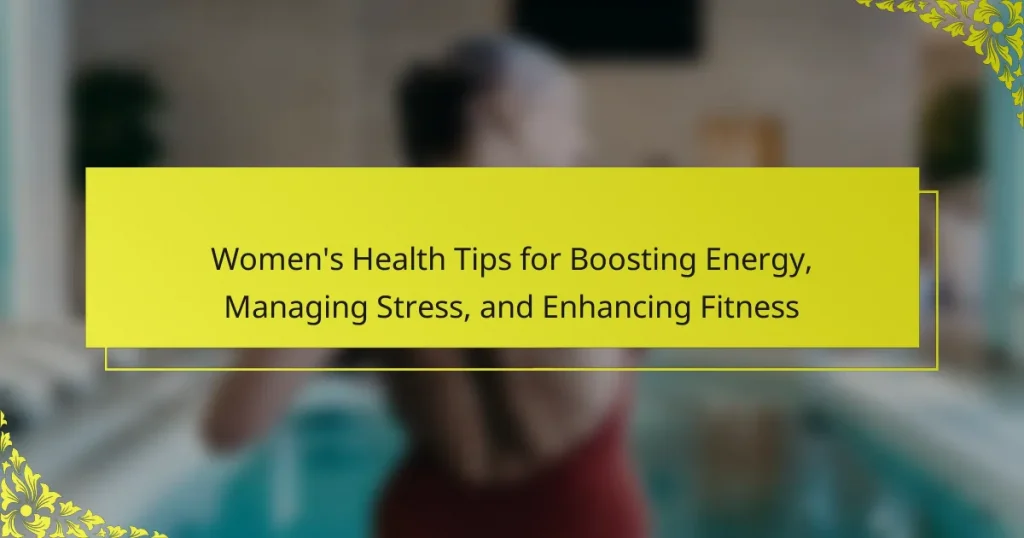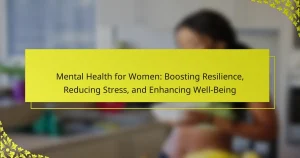Boosting energy, managing stress, and enhancing fitness are crucial for women’s overall health. Regular physical activity and a balanced diet are essential for sustaining energy levels. Effective stress management techniques, such as mindfulness and exercise, can significantly improve mental well-being. Addressing unique fitness challenges through tailored plans can help women achieve their health goals.

How Can Women Boost Their Energy Levels Naturally?
Women can boost their energy levels naturally through lifestyle changes and dietary adjustments. Incorporating regular physical activity, such as brisk walking or yoga, enhances circulation and reduces fatigue. Consuming a balanced diet rich in whole grains, lean proteins, and plenty of fruits and vegetables provides essential nutrients. Staying hydrated is crucial; aim for at least eight glasses of water daily. Adequate sleep, approximately seven to nine hours per night, is vital for energy restoration. Stress management techniques, like mindfulness or meditation, can further enhance energy levels by reducing mental fatigue.
What Are the Most Effective Dietary Changes for Increased Energy?
To boost energy, women should focus on dietary changes such as increasing whole foods, staying hydrated, and balancing macronutrients. Incorporating complex carbohydrates, healthy fats, and lean proteins can stabilize energy levels throughout the day.
1. Increase whole foods: Prioritize fruits, vegetables, and whole grains for sustained energy.
2. Stay hydrated: Aim for at least 8 cups of water daily to support overall energy.
3. Balance macronutrients: Combine carbohydrates with proteins and fats for optimal energy release.
4. Limit sugar: Reduce refined sugars to prevent energy crashes.
5. Regular meals: Eat small, frequent meals to maintain energy levels.
These changes can significantly enhance energy, improve mood, and support overall well-being.
Which Physical Activities Are Best for Energy Enhancement?
Engaging in activities like brisk walking, cycling, and yoga effectively boosts energy levels. These exercises enhance circulation, improve mood, and reduce stress, all contributing to increased vitality.
Brisk walking increases heart rate and oxygen flow, providing immediate energy boosts. Cycling offers a low-impact option that builds endurance and stamina. Yoga combines physical movement with mindfulness, promoting relaxation and energy balance.
Incorporating these activities into a weekly routine can lead to significant improvements in overall energy and fitness levels. Aim for at least 150 minutes of moderate exercise weekly for optimal results.
How Does Regular Exercise Impact Energy Levels?
Regular exercise significantly boosts energy levels by improving cardiovascular health and enhancing overall stamina. Engaging in physical activity increases blood flow, delivering more oxygen and nutrients to muscles. As a result, individuals often experience reduced fatigue and increased vitality throughout the day. Research indicates that even moderate exercise can elevate mood and reduce stress, further contributing to higher energy levels. Consistent workouts, such as aerobic exercises, can lead to long-term energy improvements, making it easier to manage daily tasks and responsibilities.
What Role Do Hydration and Sleep Play in Energy Management?
Hydration and sleep are crucial for energy management as they directly impact physical and mental performance. Adequate hydration enhances cognitive function and reduces fatigue, while quality sleep restores energy levels and improves mood. Studies show that even mild dehydration can lead to decreased alertness and increased feelings of tiredness. Similarly, insufficient sleep can impair energy regulation, making it harder to manage stress effectively. Prioritizing both hydration and sleep can significantly boost overall energy and well-being.

What Strategies Help Women Manage Stress Effectively?
Effective strategies for women to manage stress include regular physical activity, mindfulness practices, and maintaining a balanced diet. Engaging in exercise releases endorphins, which improve mood. Mindfulness techniques, such as meditation and deep breathing, help reduce anxiety. A nutritious diet supports overall well-being and energy levels. Prioritizing sleep and establishing a support network further enhance stress management.
How Can Mindfulness and Relaxation Techniques Reduce Stress?
Mindfulness and relaxation techniques effectively reduce stress by promoting mental clarity and emotional balance. These practices, such as meditation and deep breathing, activate the body’s relaxation response, lowering cortisol levels. Research shows that regular mindfulness practice can enhance focus and improve overall well-being. Engaging in these techniques fosters resilience against stressors, leading to better energy management and fitness outcomes for women.
What Are the Benefits of Social Support in Stress Management?
Social support significantly enhances stress management by providing emotional, informational, and practical assistance. It fosters resilience, reduces feelings of isolation, and improves overall mental health. Research indicates that social connections can lower cortisol levels, leading to decreased stress. Engaging with supportive networks also promotes positive coping strategies and encourages healthier lifestyle choices.
What Are Some Practical Stress-Relief Activities?
Engaging in practical stress-relief activities can significantly enhance women’s health by boosting energy and managing stress. Activities such as yoga, meditation, deep breathing exercises, and regular physical exercise are effective. For example, yoga improves flexibility and reduces tension, while meditation can lower cortisol levels. Incorporating these activities into daily routines fosters a balanced lifestyle.
How Can Time Management Improve Stress Levels?
Effective time management significantly reduces stress levels by promoting organization and prioritization. By allocating specific time slots for tasks, individuals can avoid last-minute rushes and enhance productivity. Studies indicate that practicing time management can lead to a 25% increase in efficiency, allowing for better work-life balance. This balance is crucial for women’s health, as reduced stress contributes to improved energy levels and overall well-being. Implementing techniques like the Pomodoro Technique or time-blocking can further optimize daily routines, leading to sustained energy and reduced anxiety.

What Unique Fitness Challenges Do Women Face?
Women face unique fitness challenges such as hormonal fluctuations, societal expectations, and time constraints. Hormonal changes can affect energy levels and motivation, impacting workout consistency. Societal pressures often lead to unrealistic body image standards, creating stress that hinders fitness efforts. Additionally, balancing work, family, and personal time can limit opportunities for exercise. Addressing these challenges through tailored fitness plans can enhance women’s health and overall well-being.
How Do Hormonal Changes Affect Fitness Goals?
Hormonal changes can significantly impact fitness goals by influencing energy levels, mood, and physical performance. Fluctuations in hormones such as estrogen and progesterone affect metabolism and muscle recovery. For instance, during the menstrual cycle, women may experience variations in strength and endurance. Understanding these changes allows for better alignment of fitness routines with hormonal phases, optimizing energy management and stress reduction. Tracking cycles can help tailor workouts to align with peak performance times, enhancing overall fitness outcomes.
What Are the Best Fitness Routines for Different Life Stages?
The best fitness routines for different life stages focus on energy boosting, stress management, and fitness enhancement. In early adulthood, high-intensity interval training (HIIT) promotes cardiovascular health and muscle strength. During pregnancy, low-impact activities like swimming and yoga enhance flexibility and reduce stress. Postpartum, strength training helps regain muscle tone and energy levels. For middle age, incorporating balance exercises and moderate cardio supports overall wellness. In later years, gentle activities like walking and stretching maintain mobility and mental well-being. Each stage requires tailored approaches to optimize health outcomes.
How Can Women Overcome Common Barriers to Exercising?
Women can overcome common barriers to exercising by prioritizing time, setting achievable goals, and finding supportive environments. Addressing time constraints involves scheduling workouts like appointments. Setting realistic goals enhances motivation and progress tracking. Joining classes or groups fosters community support, which can boost accountability and enjoyment. Additionally, exploring various exercise forms, such as yoga or dance, can increase engagement and reduce monotony.
What Role Does Body Image Play in Women’s Fitness?
Body image significantly influences women’s fitness by affecting motivation, self-esteem, and exercise habits. A positive body image encourages women to engage in regular physical activity, leading to enhanced fitness levels. Studies show that women with a healthy body image are more likely to adopt sustainable fitness routines and prioritize self-care. Conversely, negative body image can lead to stress and decreased motivation, undermining fitness goals. Supporting a positive body image through community and education can foster better health outcomes and enhance overall fitness experiences for women.

What Rare Tips Can Further Enhance Energy and Fitness?
Incorporating rare tips can significantly enhance energy and fitness for women. Focus on nutrient timing, which involves consuming specific nutrients at optimal times to maximize energy levels and recovery. For instance, consuming protein and carbohydrates within 30 minutes post-exercise can enhance muscle recovery.
Another unique strategy is engaging in high-intensity interval training (HIIT) just twice a week. This method boosts metabolism and improves cardiovascular fitness efficiently. Additionally, consider mindfulness practices like yoga or tai chi, which can reduce stress and improve overall energy levels.
Lastly, prioritize hydration with mineral-rich water, as electrolytes play a crucial role in maintaining energy and performance.
How Can Adaptogens Support Energy and Stress Levels?
Adaptogens can enhance energy and reduce stress by regulating the body’s response to stressors. They support adrenal function, which is crucial for maintaining balanced energy levels. For example, ashwagandha and rhodiola have shown potential in improving fatigue and stress resilience. These herbs may also promote better sleep quality, further aiding energy restoration. Regular intake can lead to noticeable improvements in overall well-being and fitness.
What Are the Benefits of Cross-Training for Women?
Cross-training offers numerous benefits for women, including improved overall fitness, enhanced energy levels, and effective stress management. This approach combines various exercise forms, such as strength training, cardio, and flexibility work, promoting balanced physical development.
Cross-training can reduce the risk of injury by strengthening different muscle groups, preventing overuse. It also boosts motivation through varied workouts, keeping routines fresh and engaging. Studies show that women who cross-train experience higher energy levels and better mood regulation, contributing to enhanced mental well-being.
Incorporating cross-training into a fitness regimen can lead to improved endurance, strength, and flexibility. This holistic approach not only supports physical health but also fosters resilience against stress, making it an essential strategy for women’s health.
How Can Women Utilize Recovery Techniques for Optimal Fitness?
Women can effectively utilize recovery techniques to enhance fitness by prioritizing rest, nutrition, and mindfulness practices. Recovery techniques such as adequate sleep, hydration, and balanced meals help restore energy levels and reduce stress. Incorporating practices like yoga or meditation promotes mental clarity and emotional resilience, which are vital for optimal performance. Engaging in active recovery, such as light exercise or stretching, can also facilitate muscle recovery and enhance overall fitness.
What Innovative Tools Can Help Track Energy and Fitness Progress?
Wearable fitness trackers and mobile apps are innovative tools that effectively track energy and fitness progress. These devices monitor metrics like heart rate, steps taken, and calories burned, providing real-time feedback. Popular options include Fitbit, Garmin, and Apple Watch, which offer unique features such as sleep tracking and guided workouts. Additionally, apps like MyFitnessPal and Strava allow users to log workouts and analyze performance trends over time. These tools empower women to manage their energy levels and enhance fitness routines through data-driven insights.

What Are the Best Practices for Sustaining Energy and Fitness?
To sustain energy and fitness, women should prioritize balanced nutrition, regular physical activity, and effective stress management. Incorporating whole foods, staying hydrated, and maintaining a consistent exercise routine can significantly enhance overall well-being. Regular sleep patterns and mindfulness practices also contribute to energy levels and fitness.
How Can Women Create a Balanced Routine for Long-Term Success?
To create a balanced routine for long-term success, women should prioritize energy management, stress reduction, and fitness enhancement. Incorporate regular physical activity, such as aerobic exercises and strength training, to boost energy levels. Implement mindfulness practices, like meditation or yoga, to effectively manage stress. Establish a consistent sleep schedule to improve overall well-being. Focus on a nutritious diet rich in whole foods to sustain energy throughout the day. Lastly, set achievable goals to maintain motivation and track progress.
What Common Mistakes Should Women Avoid in Their Health Journey?
Women should avoid neglecting self-care, ignoring nutrition, and underestimating stress management in their health journey. Prioritizing self-care can enhance energy levels significantly. A balanced diet rich in nutrients supports overall well-being. Additionally, effective stress management techniques, such as mindfulness, can improve mental health and fitness outcomes. These common mistakes can lead to burnout and hinder progress in achieving health goals.
What Expert Insights Can Women Apply Immediately for Better Health?
Women can apply expert insights like prioritizing sleep, engaging in regular physical activity, and practicing mindfulness for better health. These strategies boost energy, manage stress, and enhance fitness. Research shows that adequate sleep improves cognitive function and emotional resilience. Regular exercise, such as aerobic workouts, increases stamina and reduces anxiety. Mindfulness practices, including meditation, enhance mental clarity and emotional balance. Implementing these insights can lead to significant improvements in overall well-being.




